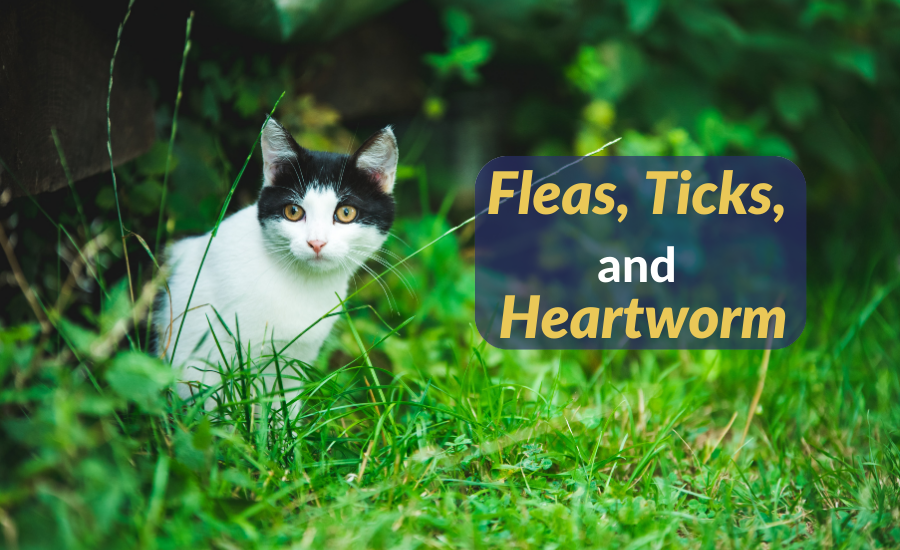The Summer Trifecta
Summer days spent outside. The weather gets warmer and we spend more time outside as a family, including our pets. Extra time spent outside makes our furry friends more susceptible to the machinations of critters that are best avoided. These critters – fleas, ticks, and heartworm – can be anything from a nuisance to a significant health risk to your pet. They’re the summer parasitic trifecta.
What Are They?
Fleas, ticks, and heartworm are all part of the same species: parasites. In other words, they need to feed off other animals to survive. They’re all external parasites, which means that they live on or infect another being – referred to as the parasite’s host – from the outside of its body. Fleas and ticks are insects while heartworm is spread through mosquito bites.
What Do They Do?
Fleas are tiny insects that prefer shady, moist areas like shrubs or grass. They can live there until they find a warm-blooded host like a dog, cat, or ferret to attach to. They’re alive all year long but become more active during warm weather. Fleas can cause a great deal of irritation to a pet, especially skin irritation, but they can also cause infection or intestinal parasites.
Fleas can be spread from pets to people, too, causing bites and irritation for humans, as well. They’re very hard to get rid of once they enter your home. They live on furniture, hide in rugs, and can even get into bedding. Once they’re in your home, it’s very difficult to get rid of them. Doing so requires a rigorous cleaning regimen that may need to be repeated more than once.
Like fleas, ticks are more active during the warmer months. They carry many diseases that can cause both animals and humans to become very ill. Tick-borne diseases include:
- Dog Tick Fever
- Ehrlichiosis
- Lyme Disease
- Rocky Mountain Spotted Fever
All of these illnesses can cause a multitude of debilitating symptoms such as joint pain, anemia, and lethargy.
The third of this summer parasite trifecta is heartworm, which runs the risk of being the deadliest of the three. Heartworm is spread through the bite of infected mosquitos. The parasite can survive in dogs for five to seven years and cats for two to three years. There can be no symptoms initially after infection, but symptoms increase as the heartworms mature and multiply in your pet’s body. Treatment for heartworms is very expensive and not always effective.
Symptoms of heartworm are:
- Coughing
- Breathing difficulty
- Sluggishness
- Reduced ability to exercise
If your pet exhibits these symptoms, they need to visit us.
The Best Medicine
The best medicine is, of course, prevention. All three parasites can be prevented with medication. There are combination medications available that provide protection against fleas, ticks, and heartworm. In addition, there is a vaccine available for Lyme disease.
You can provide additional protection against fleas and ticks by checking your pet carefully after they’ve been outside. Your pet will benefit from a thorough check-in and around their:
- Ears
- Belly
- Tail
- Groin
- Back legs
- Neck, around the collar area
Minnesota Veterinary Hospital
Minnesota Veterinary Hospital is located in Shoreview, MN. We provide top-quality care for your pet and have done so since 1968. Call us at 651-484-3331 or email at [email protected] so we can help keep your pet safe from this trio of summer pests.
Image credit: Unsplash

